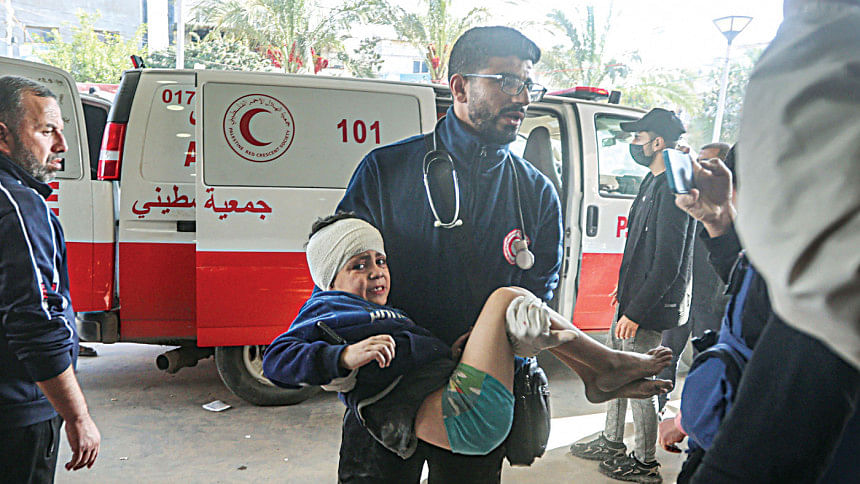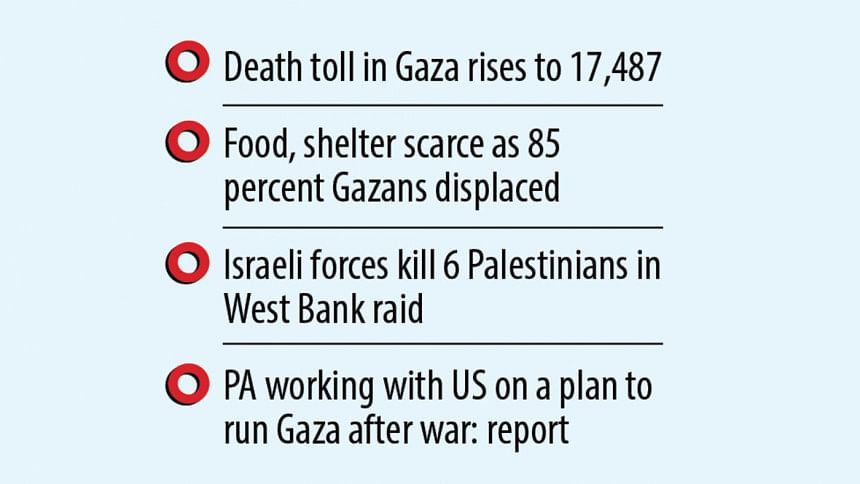Dozens killed as Israel ramps up Gaza strikes

Israel sharply ramped up strikes on the Gaza Strip, pounding the length of the Palestinian enclave and killing hundreds in a new, expanded phase of the war that Washington said veered from Israeli promises to do more to protect civilians.
The Israeli military yesterday said it had struck more than 450 targets in Gaza from land, sea and air over the past 24 hours - the most since a truce collapsed last week and about double the daily figures typically reported since then.
With 85 percent of Gazans now displaced and unable to access any aid, hospitals overrun and food running out, the main UN agency there said society was "on the verge of a full-blown collapse".
Meanwhile, a UN Security Council vote on a demand for a humanitarian ceasefire in the Israel-Hamas war was delayed by several hours yesterday until after a planned meeting between Arab ministers and US Secretary of State Antony Blinken.
The 15-member council had been due to vote on a brief draft resolution yesterday morning, but it was delayed at the request of the United Arab Emirates, which put forward the text with the support of Arab and Organisation of Islamic Cooperation states.
To be adopted, a resolution needs at least nine votes in favor and no vetoes by the five permanent members - the United States, Russia, China, France or Britain. The US has said it does not support any further action by the council at this time.
On the ground, residents and the Israeli military both reported intensified fighting in both northern areas, where Israel had previously said its troops had largely completed their tasks last month, and in the south where they launched a new assault this week.

Gaza's health ministry reported 350 people killed on Thursday, bringing the death toll from Israel's two-month campaign in Gaza to more than 17,487, with thousands more missing and presumed buried under rubble. More strikes were reported yesterday morning in Khan Younis in the south, the Nusseirat camp in the centre and Gaza City in the north.
"As we stand here almost a week into this campaign into the south... it remains imperative that Israel put a premium on civilian protection," US Secretary of State Antony Blinken told a press conference in Washington on Thursday.
"And there does remain a gap between... the intent to protect civilians and the actual results that we're seeing on the ground."
Israel launched its attack on Gaza after Hamas fighters intruded into Israel on Oct 7, killing 1,200 people and seizing more than 240 hostages, according to Israeli tallies.
Since then, the vast majority of Gaza's 2.3 million people have been driven from their homes, many forced to flee three or four times, with only the belongings they can carry.
With the fighting now extended across both halves of the Gaza Strip at the same time, residents say it has become almost impossible to find refuge.
Reuters journalists in the southern Gaza Strip have seen dead and wounded overrunning the main Nasser hospital in Khan Younis, where there was no room on the floor for arriving patients sprawled across bloodsmeared tiles.
In Rafah, further south hard against the border with Egypt, Thaer Kadeeh is living with his family in a makeshift tent from sheets of thin plastic.
"We don't sleep. Fear, hunger and cold, the three combined and no one is looking out for us," he told Reuters. "You try to make the feeling of hunger go away for like an hour, but then the child asks again for food."
Reuters was unable to enter other parts of the enclave but reached residents by telephone who described similar scenes of desperation. With the fighting now in all directions, there was no place left to flee, said Yamen, sheltering at a school in central Gaza with his family.
"Inside the school is like outside it: the same feeling of fear of near death, the same suffering of starvation," he said. "Every day we say we somehow survived. But for how long?"
Meanwhile, the Palestinian Authority is working with US officials on a plan to run Gaza after the war is over, Bloomberg News reported, citing Palestinian Prime Minister Mohammad Shtayyeh.
The preferred outcome of the conflict would be for Hamas, which controls Gaza, to become a junior partner under the Palestinian Liberation Organization (PLO), helping to build a new independent state that includes the West Bank, Gaza and East Jerusalem, Ramallah-based Shtayyeh said in an interview with Bloomberg News on Thursday.
"If they (Hamas) are ready to come to an agreement and accept the political platform of the PLO, then there will be room for talk. Palestinians should not be divided," Shtayyeh said, adding that Israel's aim to fully defeat Hamas is unrealistic.
In the occupied West Bank, which is ruled by PA, Israeli forces shot dead six Palestinians yesterday in a raid on a refugee camp, the Palestinian health ministry said.

 For all latest news, follow The Daily Star's Google News channel.
For all latest news, follow The Daily Star's Google News channel. 



Comments